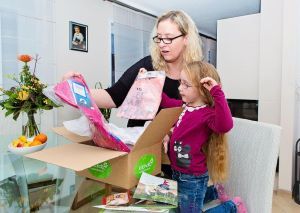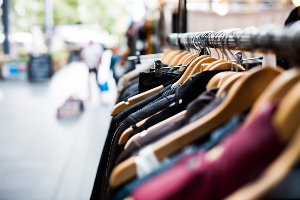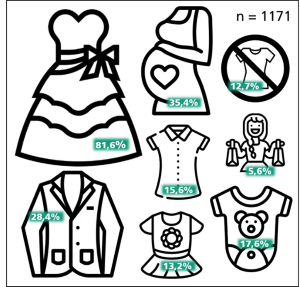Innovative circular business models in the clothing sector no longer offer clothing for sale, but for temporary rental. This is because small children‘s clothing or fashionable women‘s clothing in particular is often not worn for very long. “Wear2Share” investigates whether and how such business models lead to more sustainable consumption, how they can be optimized economically and ecologically, and whether they are suitable for mass consumption in the long term.

Renting instead of buying
Clothing leads to a high direct and indirect consumption of resources due to the large quantities that are consumed. At the same time, the potential for savings is also very high, as on average one in three garments is never worn or is worn less than once in three months. New circular business models could help to avoid such unused purchases and contribute to a much more efficient use of garments. They make clothing available on loan, thus ensuring that unworn garments quickly find a new user. However, not every circular business model automatically leads to improvements in the environmental performance, since the savings in resources can be offset by high logistics and cleaning costs.
The aim of the project Wear2Share is to analyze the ecological and economic sustainability potential using two exemplary circular business models and to clarify the question of whether these circular business models really do help to improve the environmental impact of garments. In addition, boundary conditions are identified that influence the environmental assessment of the models. Finally, the project examines potential for optimization in the business model.

Digital potentials
New circular business models become possible with the help of digitalisation. Digital access and the convenient lending process make these business models able to compete with conventional purchasing. To find out how well these new lending models are being accepted, researchers have already conducted consumption studies and representative surveys to determine their market potential as well as consumers’ motives for use. The data thus obtained further serves as the basis for the subsequent life cycle assessment. In addition, indepth interviews with the project partners of Relenda GmbH as well as an analysis of relevant business data provide information about possible optimization potential for the digital business model of rental clothing.

Results (Status June 2022)
In light of the global textile industry’s influence on the climate crisis, many companies are asking themselves how they can create offers that can fulfill the desire for fashion in a more sustainable way. One concept that has been offered in Germany for about 10 years is clothing rental, but so far without market-penetrating success. As part of the BMBF project Wear2Share, Fraunhofer ISI has investigated opportunities for optimization from an ecological, business management and consumer psychology perspective. The basis is a close cooperation with the management of the former Relenda GmbH, which was able to gain experience in the rental of sustainable women's outerwear, children's fashion and as a cooperation partner for Tchibo Share over many years and provided researchers with deep insights into their business model. This information was complemented by an analysis of the market potential through customer and representative target group surveys.* Furthermore, a stakeholder workshop was held with representatives from the textile industry and its periphery, and interviews were conducted with experts.
First, the good news: renting fashion has a more advantageous environmental balance compared to online shopping, since the energy saved by reducing the production of new garments more than compensates for the energy needed for increased two-way shipping. The savings potential for the modeled case of women's outerwear with real-world usage data is about 30 percent for greenhouse gas emissions and almost 40 percent for water consumption. Savings are possible from the second rental cycle onwards. However, the sensitivity analyses also show that savings can be lost through unfavorable behavior, such as long car journeys during shipping, frequent laundering, and use of dryers. All in all, renting fashion makes sense for those consumers who want to live in a climate-friendly way and still be fashionably dressed.
In fact, a third of the non-customers surveyed could imagine renting clothing, 20 percent of them in the subscription model that is common in the industry. In the case of subscription models, the price is the decisive criterion, more important than the number of items, frequency of change, sustainability, or brands that can be obtained via the subscription flat rate. The most important reason for renting is the possibility of not having to buy clothing that is only needed once (77%). Also key is the avoidance of never-worn purchases (61%), closely followed by the desire to try out new styles without obligation (60%). Slightly more than half of women (53%) cite environmental considerations as a motivation. Potential savings, however, hardly convince respondents, as only 14% of women gave this as a reason for renting.
One factor in particular that is often underestimated presents itself as an obstacle: trust. Sharing economy business models based on collaborative consumption are based on trust. Sensitive issues for potential customers of fashion rental models include the question of liability for damages (69%), the fear of paying more money in the end than if the product were purchased directly (52%) and concerns about the quality of the rented products (55%). Also hindering is the lack of awareness of alternative consumption models. Only 39% of respondents know about the possibility of renting clothing, while two-thirds have never heard of the concept.
*conducted in January 2020, n = 1300, adjusted n = 1171
Team of researchers and companies
In the project Wear2Share, researchers at Fraunhofer ISI (Karlsruhe) work together with existing companies in order to shed light on current circular business models operating in the market. Relenda GmbH of-fered various digital rental models for children’s and ladies’ wear through the end of 2020. In the project, the company therefore provided its expertise and insights based on real-world experiences as well as data from its own rental platforms. In addition, the manufacturers’ perspective is incorporated through the associated participation of bubble.kid berlin kidswear, a manufacturer of durable children’s clothing, as well as the expertise of Thekla Wilkening, an expert for circular business models in the textile and clothing industry.
The project provides insights into the sustainability of circular business models and aims to clarify which product groups lend themselves to being transferred to such circular business models. In addition to generating new insights, the project focuses on the strategic transfer of knowledge into practice in order to show companies that are committed to the circular economy which paths exist to sustainable development.
Picture credits: © Relenda GmbH; pexels
Publications
Final report (January 2023)
Bodenheimer, Miriam; Schuler, Johannes; Wilkening, Thekla (2022): Drivers and barriers to fashion rental for everyday garments: an empirical analysis of a former fashion-rental company. In: Sustainability: Science, Practice and Policy 18 (1), p. 344–356.
Interview in the journal "TextilWirtschaft" (2022): " Wear2Share - so kann Circular Fashion erfolgreich funktionieren"
Project flyer of the funding measure (German / English) (March 2021)
The project flyers offer an insight into the contents and goals of the ReziProK projects and present first results in each case.
Project sheets of the funding measure (German) (August 2019)
The project sheets provide a brief overview of the individual projects and their goals.
Contributions to the ReziProK Transfer Conference in June 2022
Poster (German) (June 2022)
Presentation (German) (June 2022)
Contributions to the ReziProK Kick-off event in December 2019
Poster - in German (December 2019)
Presentation - in German (December 2019)
#Leihmodelle (in German)
Klamotten leihen statt kaufen - in German (05.05.2020)
Picture credits: © Relenda GmbH; @ pexels;Fraunhofer ISI with icons from flaticon.com
(Eucalyp, Smashicons, ultimatearm, Freepik)
